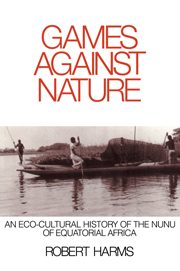Book contents
- Frontmatter
- Contents
- List of Maps
- Preface
- Preface for the paperback edition
- 1 Introduction
- 2 The Antecedents
- 3 The Tactics
- 4 The Strategies
- 5 The Drylands
- 6 The River
- 7 The Core
- 8 The Region
- 9 The Traders
- 10 The Troubles
- 11 The Opportunities
- 12 The Battle
- 13 Conclusion: Nature and Culture
- Abbreviations
- Sources Cited
- Archives
- Index
13 - Conclusion: Nature and Culture
Published online by Cambridge University Press: 03 November 2009
- Frontmatter
- Contents
- List of Maps
- Preface
- Preface for the paperback edition
- 1 Introduction
- 2 The Antecedents
- 3 The Tactics
- 4 The Strategies
- 5 The Drylands
- 6 The River
- 7 The Core
- 8 The Region
- 9 The Traders
- 10 The Troubles
- 11 The Opportunities
- 12 The Battle
- 13 Conclusion: Nature and Culture
- Abbreviations
- Sources Cited
- Archives
- Index
Summary
THE RELATIONSHIP BETWEEN people and their environment has been a topic of discussion throughout human history. It is an implicit theme of many myths collected throughout the world, and it has been a subject of ongoing debate in Western scholarship. In ancient Greece, it was discussed by philosophers; during the Middle Ages, it was debated by theologians; during the Enlightenment, it was scrutinized by men of letters; in the nineteenth century, it was examined by geographers; and in the twentieth century, it has been analyzed by anthropologists and ecologists. Throughout this long period, the debate has focused on three propositions: that people are geographic agents who can alter or even transform the earth; that individuals and societies are influenced and perhaps shaped by their environment; and that nature manifests a coherent design.
Ever since Hippocrates wrote Of Airs, Waters, and Places, comparative ethnography has been used to test these propositions. Comparing the cultures of peoples living in different environments is a useful way to separate cultural features that seem related to specific environments from those that seem independent of any given type of natural setting. In the twentieth century, the ethnographic case study, which permits relations between a specific culture and a specific environment to be explored in greater depth, has emerged as an alternative approach. The two approaches are complementary.
- Type
- Chapter
- Information
- Games against NatureAn Eco-Cultural History of the Nunu of Equatorial Africa, pp. 243 - 256Publisher: Cambridge University PressPrint publication year: 1988



